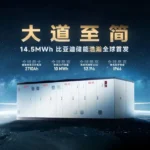Revolutionizing the Energy Industry: Trends and Innovations
The energy sector is on the cusp of a significant transformation, driven by technological advancements, shifting consumer demands, and pressing environmental concerns. As the world grapples with the challenges of climate change, energy security, and sustainability, innovations in the energy industry are gaining traction. With renewable energy sources becoming increasingly cost-competitive, the stage is set for a substantial overhaul of the traditional energy landscape.
##
Decarbonization and the Rise of Renewables
The push towards decarbonization is one of the most significant drivers of change in the energy industry. Renewable energy sources, such as solar and wind power, are becoming more viable and economical, making them attractive alternatives to fossil fuels. In 2020, renewables accounted for 26% of global electricity generation, up from 21% in 2015. This trend is expected to continue, with the International Energy Agency (IEA) predicting that renewables will become the primary source of global power generation by 2025.
###
Solar Energy: The Path to Grid Parity
Solar energy, in particular, has made tremendous strides in recent years. The cost of solar panels has plummeted by over 70% in the last decade, making solar energy more competitive with fossil fuels. This has led to a surge in solar energy adoption, with solar power capacity increasing by 22% in 2020 alone. As technology continues to improve and economies of scale are achieved, solar energy is poised to reach grid parity in many markets, further accelerating its growth.
##
Energy Storage: The Key to Unlocking Renewables
Energy storage is another crucial aspect of the energy industry’s transformation. As renewable energy sources become more prevalent, the need for efficient and cost-effective energy storage solutions grows. Batteries, in particular, have emerged as a leading technology, with lithium-ion batteries dominating the market. The cost of battery storage has fallen by over 80% in the last decade, making it more feasible for widespread adoption. This has significant implications for the grid, enabling greater integration of renewables and enhancing energy security.
###
Smart Grids and Energy Efficiency
The integration of renewables and energy storage is also driving the development of smart grids. Smart grids leverage advanced technologies, such as IoT sensors and AI, to optimize energy distribution, predict energy demand, and detect potential outages. This not only enhances energy efficiency but also improves the overall resilience of the grid. Furthermore, smart grids enable greater consumer engagement, allowing individuals to monitor and manage their energy usage more effectively, contributing to a more sustainable energy future.
##
The Future of Energy: Emerging Trends and Technologies
As the energy industry continues to evolve, several emerging trends and technologies are worth noting. Hydrogen fuel cells, for instance, are gaining attention as a potential alternative to traditional energy sources. Additionally, advancements in nuclear energy, such as small modular reactors, are being explored for their potential to provide clean and reliable baseload power. These innovations, along with ongoing improvements in renewable energy and energy storage, will play a crucial role in shaping the future of the energy industry.
The energy industry’s transformation is underway, driven by technological innovation, shifting consumer preferences, and the imperative to address climate change. As the world moves towards a more sustainable and resilient energy future, understanding these trends and innovations is essential for navigating the complex landscape of the energy sector. With the potential for significant economic, environmental, and social benefits, the future of energy looks brighter than ever.

.png?w=1024&resize=1024,1024&ssl=1)

_2.png?w=150&resize=150,150&ssl=1)
.png?w=150&resize=150,150&ssl=1)


.png?w=150&resize=150,150&ssl=1)